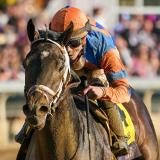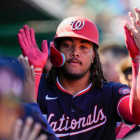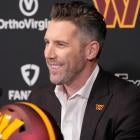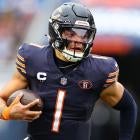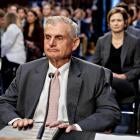In 2012 Kentucky had six players selected in the NBA Draft after winning a national championship. The assumption is that in 2015 Kentucky will match or one up that number. But it is interesting to look back and realize that sometimes players are selected higher under the assumption of their talent based upon who they played for -- Wildcats coach John Calipari has great respect in NBA circles -- and with -- Anthony Davis truly was a rising tide who lifted all ships.
Kentucky's 2012 team gave us:
• Davis: Likely All-NBA
• Michael Kidd-Gilchrist: Drafted way too high based on lack of offensive skill/position - work in progress, but an elite defender
• Terrence Jones: Solid role playing starter for Rockets
• Marquis Teague: D-League
• Doron Lamb: D-League
• Darius Miller: Playing in Germany
With Teague (a super young first-round pick who hasn't stuck yet) as the only true "miss," the vaunted six players from the 2012 team would have what people in NBA circles would call three "pros," one of whom is a superstar.
So what about this year?
The potential superstar: Karl Anthony Towns
6-foot-10 1/4 (in socks) 7-foot-3 wingspan
With a Nov. 15 birthday, Towns is only 19 years old. The premiere prospect of this group, Towns may be the top prospect in the draft as well. First of all Towns is bright, and by all accounts is a great kid with no baggage what so ever. On the floor he is as big as listed, is a premier shot blocker and does so with timing and length more than raw athletic ability. This, to me, is a better trait to have since athleticism can go as a player ages, but timing, touch and feel improve and never leave you. Towns is a very good offensive rebounder who is physical and not afraid of the fight, he has good feet and hands as well. At the block, Towns can score on a jump hook over each shoulder and has been well taught to “take a look” for the double team before going into his move. Towns is not a great face-up shooter yet, but as an 80 percent free-throw shooter, he will continue to develop his face-up game and potentially be a 20-foot jump shooter. In total, Towns can score, defend and rebound at the block, make shots and is a willing passer.
On the negative side, Towns is not great on ball-screen coverage. Of course he is better than Duke's Jahlil Okafor, but he bends too much at the waist when switched onto a wing or guard and can be beaten off the bounce. Towns disappears for stretches and just goes with the flow on offense, some of this is because Kentucky has so many weapons, some of it his personality and desire to just play. Is he an “Alpha”? I do not believe so in personality, but Towns can be an All-Star center in his first 4 years in the NBA and his body is the type that doesn't appear to be the kind that would gain weight or breakdown (in appearance only, doctors obviously will scan as big guys breakdown).
Reminds scouts of a young Sam Perkins. (Perkins early in the NBA, not when he became a 3-point shooter late in his career.) Projection: No. 2 overall pick.
The potential All-Star: Devin Booker
6-5 1/2 (in socks) 6-6 1/2 wingspan | 18 years old (Nov. 30 birthday)
A silky smooth shooter who struggled to find his rhythm early and late in the season, but has all the makings of an starting NBA 2-guard for years to come. Booker, whose dad was a star at Missouri, was probably the least heralded of the 2014 Kentucky recruiting class. His athletic and length numbers are the least spectacular going back to Kentucky’s Pro Day, but, what Booker lacks in those numbers he makes up for in basketball skill. Booker’s release is high, his shot is compact (not a lot of extra movement, which is good) and he gets it off quickly. Booker has feel in terms of reading defenses and finding shots and at just 18 years old his body will develop substaintially over the next 3-to 4 years. Booker’s up-and-down year at Kentucky should actually help him in the NBA as he learned to get his motor running quickly despite fewer minutes and shots than say D’Angelo Russell, and early in his NBA career he may have to learn to be efficient without the volume of starters shots. Defensively Booker was mostly good, though he was “beasted” in the post by Wisconsin. Booker is very competitiveve, a gym rat and someone with loads of potential. He can pass and shoot and though he is not a point or even a lead guard, he does not try to be either ether.
On the other hand Booker’s shot looks far better than numbers (28 percent on 3-point field goals since Feb 28. Booker did look like a rag doll guarding the post, he has average arm length and isn't a freak athlete. Booker is an Alpha as a scorer and truly seems like he wants to be the focal point of the offense. It will be interesting to see how he manages to eventually get that opportunity in the NBA, when he could have been that guy with one more year in college.
Reminds me of Klay Thompson at the same age.
Projection: Top 10, potential All-Star
The potential elite role player:Willie Cauley Stein
WCS is an athletic “Freak”. “Freak” is used in basketball as a term of affection. Cauley- Stein has footspeed and lateral agility that are not normally part of a 6-11, 240-pound athlete's game. He can guard four to five positions on the floor. Ironically, he might struggle most with massive post players as he is cut, but not a beefcake by any means. In the new age of the NBA he can switch ball screens, hedge ball screens, protect the rim and guard in the low post.
On the other hand WCS is a very limited player on the offensive end. Even in the DeAndre Jordan, Tyson Chandler mold of pick and roll to the rim, he seems a little lost as to when and when not to roll and look for the alley-oop. Cauley-Stein is still in the “should I or should I not” stage of trying to score when left alone at the top of the key and without a jumper or feel, he usually dribbles into a bad shot. He is a good, not great rebounder, a good, not great shot blocker and a phenomenal athlete who may be more effective in the more spread out NBA game.
The other big question on WCS is his drive to be great. Cauley-Stein is bright, wasn't raised as a superstar and isn't seeking the spotlight. On the other hand, he may not be a guy who would play basketball if he wasn't playing basketball to go to school or for a living. Most scouts don't consider him a “baller” per se, and that scares them. I believe he wants to win, has improved his body a ton and his game some as well, which is the sign of a guy who likes to play. I don't think WCS is an Alpha, but his position in the NBA won't allow him or need him to be an Alpha.
It is reasonable to think he has some of what has made Jordan and Chandler great in the prime of their careers as long as his drafting team understands that they were like him at 21 and he understands the process they took to become All-Star caliber players.
Reminds me of potential Tyson Chandler/DeAndre Jordan type.
Projection:Top 15
The biggest risk for a high draft pick:Trey Lyles
The Good - Lyles can play the 3 or the 4, and against Wisconsin showed some toughness in the post on defense. Lyles is an extremely skilled 6-9 player who on the offensive end can be a match-up problem in college. One issue with Lyles heading forward is that he overhandles the basketball. When he catches the ball he is always trying to make plays instead of being a pick-and-pop man or just a ball mover. This year was good for Lyles as he was not the focal point of the offense, even though he did look too often to make plays even when the game did not call for it. Lyles is really a stretch 4 who badly wants to be a 3 man, so Coach Cal started him there and moved him all over as just a forward during his year in Lexington. Herein lies the problem -- Lyles doesn’t shoot it well enough to be a wing, nor can he guard a wing, so he becomes a skilled scoring 4 man who is 6-10. There is nothing wrong with that, but it feels a little forced or even early for him to be going to the league.
Lyles is not a great rebounder, not a shot-blocker and really not a small forward, yet - while he improved his overall defensive footwork at UK, defense is not a strength. Lyles may have to become a role player as a scoring 4 man for his first couple of years while improving his range from 3-point land, where he shot 18 percent in college. Lyles' dad was a player and Trey is only 19 years old, but his need to round out his game is apparent and will determine his NBA draft spot and his future. Keep in mind, Lyles is an average athlete for the NBA, is in-between positions mentally and he may not go until very late in the first round because of these weaknesses.
Projection: 22-32
The Daniel Orton-type (Limited role at Kentucky but has a chance based upon size and some skill):Dakari Johnson
6-11 1/4 | 7-1/2 wingspan | 19-years-old
Big, strong, solidly built back-up center who will be a big strong back-up center in the NBA. Johnson is a capable scorer with a decent countermove to his drop-step to his strong right-hand (left shoulder) go-to move. He is an average rebounder, a solid defender and not really a shot blocker. At 19-years-old someone will draft him on upside and size, and the fact that his go-to skill, thought limited by minutes in college, is as a back-to-the basket scorer, and there are very few of those type of big men traditionally available.
Johnson is not “slow” but compared to his teammates, he does not move nearly as well on the floor or defending a ball screen. He is not as long-armed as WCS or Karl Towns who have 7-2 and 7-3 wing spans by comparison. Johnson is merely big and fine and will not pout at a limited role early in his career as his role has been limited in college as well. That said, I do not think he is worth a first-round pick as much as he could be an excellent second-round stash in the D-League or overseas as he needs to continue to become a dominant scorer down low.
Could very well play a long time in the NBA, but has work to do:Andrew Harrison
6-5 | 207 pounds | 6-8 1/2 wingspan
Huge lead guard who does everything relatively well and nothing poorly, though he needs to shoot at a higher percentage, of course. Harrison is a gigantic point guard, yet he doesn't usually use his size to swarm defenders, deflect balls or generally wreak havoc on offensive players. Don't get me wrong, he is huge and somewhat intimidating, but he is not Penny Hardaway or Steve Smith in using his size for an advantage at either end. On the other hand, Harrison can run a team, can make shots and has improved in his feel for the game.
The three biggest issues for Harrison heading forward are pace of play, effectiveness off a ball screen and shooting percentages. Harrison doesn't play slow, but isn't someone who plays sharply and with a purpose. Keep in mind the job of an NBA point guard is to get the ball in the scoring zone rapidly (in the NBA you have 8 seconds to get past half court) and crisply get into a set. Harrison is fine, but not sharp, precise and exact. His ball-screen defense was not tested much this year as Kentucky switched ball screens. Though he will get more help and some double teams, the overwhelming team size and length goes away and a point guard is on an island in the league. The same goes for his point guard skills on offense, can he be a good pocket passer and can he make enough shots to make the defense honor him?
Lastly there is the problem with being a twin. Being the father of twins I know the twin effect and NBA people have seen it with twins Markieff and Marcus Morris. Can Andrew and Aaron function independently? People will point to their father and yes, dads that meddle are a problem at times in college and maybe in the pros early, but separating twins in their 20s is not always easy. I think it will hurt his stock a little although Travis and David Wear have been fine this year.
Projection: Probably a mid-2nd rounder
A possible draft pick through association, respect for size and the fact that he shared minutes/shots: Aaron Harrison
Aaron Harrison is the big-shot maker and yes, the leading scorer for Kentucky this season, yet he may go undrafted. Without the point guard skills of his brother, but a better open shooter reputation-wise, Aaron’s big shots have him in higher regard by NBA brass. Again, he is really big and solid, but not elite nor would his role be easy to define in the NBA. Like his brother, he has the size and length to guard 1-3 on defense, but he isn't quick enough for point guards, big enough or tough enough in the post for big 3 men and frankly 2 guards are generally the best scoring talents in the NBA -- so good luck with that. I think there is a very good chance that Aaron Harrison goes undrafted, though he can clearly play in the NBA. Aaron has to become a lights-out shooter and with his size, bother people on defense, but until his percentages match his big-shot reputation, there is a lot of work ahead.









